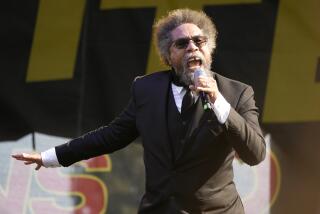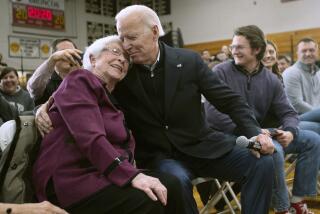POLITICS : In N.Y., Dole Almost GOP Favorite Son : Key to being on primary ballot lies with party, which plans to thwart challengers to Kansas senator’s drive for presidency.
- Share via
NEW YORK — It is a classic political power play, a throwback to the time of Tammany Hall when party bosses really controlled votes and elections.
Because of New York’s fiendishly complicated laws that make getting on the ballot an obstacle course, Senate Majority Leader Bob Dole (R-Kan.) has an excellent chance of harvesting the vast majority of the state’s 102 delegates to the Republican National Convention even before his campaign has run a single commercial.
The reason: The state Republican Party, which is largely controlled by Sen. Alfonse M. D’Amato, has made clear that using ballot access laws, it will try to thwart any GOP presidential candidate other than Dole from qualifying for the March 7 primary.
How hard is it to qualify? Unlike Democratic presidential contenders, who need only 5,000 signatures in the state to gain a spot on their primary ballot, Republican candidates have to get 1,250 certified signatures from each of the state’s 31 congressional districts. And those signatures can only be collected during a window of opportunity from Thanksgiving to Jan. 4.
Typically, GOP candidates seek twice the number of required signatures in each district, given that knocking people off the ballot is an art form in the Empire State. A minefield of minutiae--the wrong color petition cover sheet (it’s cherry red for Republicans), a misplaced comma or a wrong voter precinct after a name--can doom hundreds of legitimate signatures.
The backing of D’Amato and the GOP state organization, including Gov. George Pataki, not only gives Dole the troops necessary to properly collect signatures, but it also gives him a ready-made apparatus to challenge the petitions of opponents--a picky, time-consuming process where access to voting records is crucial.
Without the help of the party organization, Dole’s foes charge they face at best an uphill fight to qualify in enough districts to make a difference.
“This is tough. There is a wall here. I don’t know what we will do to tear down that wall,” said Charles Robbins, a spokesman for Sen. Arlen Specter (R-Pa.).
Conservative commentator Patrick J. Buchanan has firsthand knowledge of the arcane election laws; his 1992 challenge of then-President George Bush suffered a blow when he failed to get his name on New York’s primary ballot. Buchanan is not pleased by the prospect of a replay that could handicap his current campaign.
“What we have here is an anti-democratic process reminiscent of Eastern Europe in the 1950s, not America in 1995,” he said on CNN.
Nor are the candidates the only critics.
“The New York ballot laws could have been written by Kafka,” said Andrew Greenblatt, executive director of Common Cause/New York.
Indeed, fully half the ballot fights in the nation that reach the courts take place in New York.
Specter and three other GOP candidates--California Gov. Pete Wilson, Rep. Robert K. Dornan of Garden Grove and Sen. Phil Gramm of Texas--wrote to Pataki pleading for an open primary.
“When New York decided to move its presidential primary to an earlier date [from early April], the decision was made in the hope of increasing that state’s role in the nomination process,” the letter argued. “By attempting to cancel the primary by allowing only one name to appear on the ballot, the state party leadership has, if anything, reversed the people of New York’s desire to have a positive influence on the 1996 presidential nominating process.”
So far, their plea has been ignored.
“No one is holding a gun to any New York Republican to say you can’t work for or you can’t sign a petition for another candidate,” said Lawrence A. Mandelker, an election lawyer whose clients include the Republican State Committee. “What’s causing these candidates the consternation is their inability to attract experienced campaign operatives.”
Nor is much sympathy likely from the Dole camp. After all, in 1988, as the Republican State Committee swung its weight behind Bush in that year’s battle for the GOP nomination, the Kansas Republican was among those kept off the primary ballot.
More to Read
Get the L.A. Times Politics newsletter
Deeply reported insights into legislation, politics and policy from Sacramento, Washington and beyond. In your inbox twice per week.
You may occasionally receive promotional content from the Los Angeles Times.










